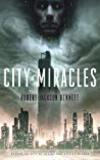
City of Miracles is a bizarre, fantastic end to a bizarre, fantastic series. Once again with another point of view, this time we follow Sigrud, with Shara and Mulaghesh both taking minor background roles, what with Shara dying in the first few pages… Hey. It’s not a spoiler, if it happens that early in the book… Plus, you know she always has another trick up her sleeve! ).
Sigrud is a fascinating character seeing him deal with yet another loss and on yet another mission to track down and kill those responsible in a way that only he can do is well worth reading on it’s own. Combine that with the inevitable-in-hindsite fallout of killing or driving off all the godly beings in a land…
The first night that humanity experienced. Before light, before civilization, before your kind named the stars. That’s what he is, that’s how he works. He is darkness, he is shadows, he is the primeval manifestation of what’s outside your windows, what’s beyond the fence gate, what lives under the light of the cold, distant moon…
…and you have quite a story.
The worldbuilding remains solid and I just want to explore more and more. Seeing the world advance and new technology in each story is particularly fascinating. A big battle set on giant cable cars crossing the mountains? Yes please. Oh, and guns. Lots of guns.
Also quite the delving into the nature of the miraculous:
Rather, I believe that miracles changed and mutated just as any organism might: the Divine Empire was a teeming ecosystem of miracles and Divine entities, all with varying levels of agency and purpose, all shifting and altering as the years went by. Though many have gone, those changes still shaped this land. The Divine was not absolute, as we might prefer to think. And though it is gone, these mutations echo on. We must prepare for what happens if one miracle should change and shift enough that, improbably, it could adapt, and survive.It does make me wonder what exactly the nature of the six Divinities was, compared to that. Just six that collected the most ‘power’? In the end, it doesn’t necessarily matter, but it’s still an interesting question.
Overall, it feels both like the previous two books, but with the darker, more intense feel that Sigrud brings to the book. There’s a theme of hope throughout the books that I particularly appreciate. Even in the darkest night, there will still come a dawn–even if you have to punch/stab/shoot the darkness to death to bring that about.
“Now—if I give you the name of the town, are you going to blow up her damn house too?”
“I guarantee nothing.”
Oh Sigrud.
Well worth the read and a satisfying finish to the series. I need to check out some of Robert Jackson Bennett ’s other works…